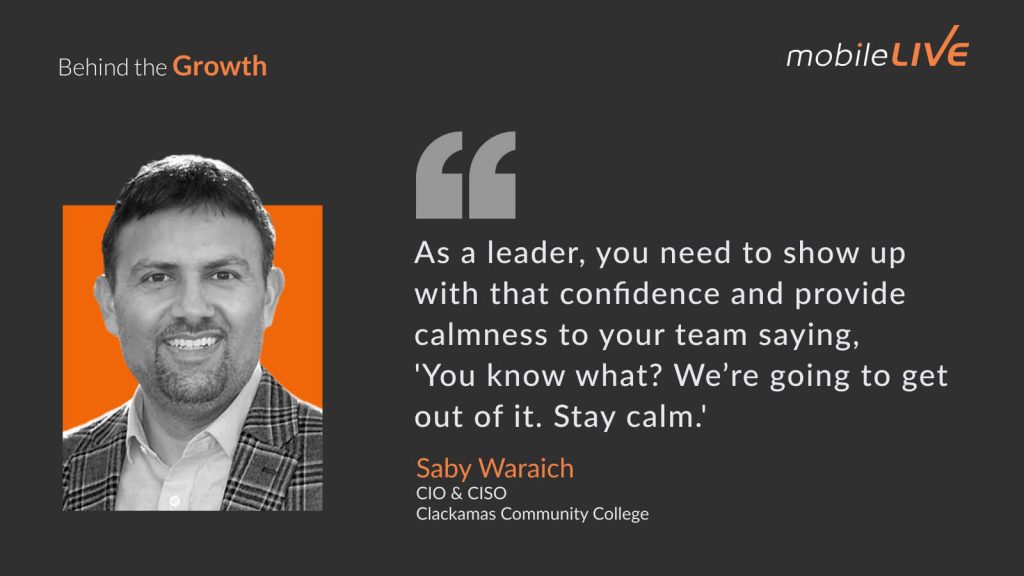Key Insights
From Scare to CARES: Transforming Leadership Models
Saby Waraich introduces the CARES framework, a leadership philosophy built around Communicate, Adapt, Relationships, Empathy, and Staying Calm. He contrasts this with traditional fear-based (Scare) management, where micromanagement and lack of transparency create toxic environments. Waraich explains that CARES fosters trust, accountability, and empowerment within teams, driving long-term success. He shares actionable advice on building relationships, communicating effectively, and adapting to change, emphasizing the importance of vulnerability and authenticity in leadership. By cultivating gratitude, empathy, and trust, leaders can create resilient teams capable of navigating complex transformations.
The Role of AI and Cybersecurity in Education
With over two decades of experience in public and education sectors, Saby Waraich explores how AI and cybersecurity are reshaping education. He highlights the exponential speed of change since COVID-19, driven by generative AI and automation. Waraich shares practical examples, such as deploying AI to automate phishing email responses, reducing manual work and improving efficiency. He also stresses the importance of public-private partnerships to align education with workforce demands, ensuring students are prepared for future technological advancements. Leaders must embrace innovation and adaptability to keep pace with this evolving landscape.
Building Resilient Teams Through Gratitude and Trust
Saby Waraich underscores the significance of building resilient teams by cultivating gratitude, trust, and empathy. He shares a personal story about engaging key team members, illustrating the impact of small gestures like flexibility and recognition. Waraich explains that trust accelerates productivity and decision-making, while gratitude strengthens relationships within teams. Leaders who empower their teams to take risks and fail fast foster innovation and adaptability. By prioritizing open communication, celebrating wins, and creating a supportive culture, leaders can inspire teams to perform at their best, even under challenging circumstances.

Episode Highlights
Leadership Challenges in Complex Transformations
Saby Waraich discusses the challenges leaders face during complex organizational transformations and the need for frameworks to manage such scenarios effectively. He explains how fear-based leadership (Scare) often hinders progress, causing micromanagement, lack of transparency, and resistance within teams. Transitioning to the CARES framework allows leaders to tackle transformations with empathy, trust, and adaptability. He emphasizes that successful transformation depends on clear communication and a unified vision.
“Many times when leaders are put in these complex transformations, they use Scare methodology. Scare is, you know, first of all, they are scared of their own job… There’s no transparency happening in the organization.”
The Role of Public-Private Partnerships in Education
Waraich highlights the importance of collaboration between academia and the private sector to bridge the gap between education and industry needs. He explains how technological advancements like AI and automation demand alignment to ensure graduates are workforce-ready. He shares his efforts to integrate cutting-edge courses, such as AI and cybersecurity, into college curricula to address emerging skill gaps.
“Industry is moving at a certain pace, and you need to produce your graduates in the fields where the jobs are going to be… Collaboration is critical between the public sector, private sector, and academia.”
Balancing Roles as CIO and CISO
Waraich discusses the unique challenges of holding dual roles as Chief Information Officer and Chief Information Security Officer. He explains how this dual perspective allows him to prioritize cybersecurity while aligning it with organizational goals. By wearing both hats, he bridges the gap between IT operations and security, fostering proactive risk management and communication within the organization.
“It becomes really easy because we have to prioritize cybersecurity, and me being in that position helps me to understand and have those conversations with our business partners.”
Building a Culture of Calm and Confidence
Waraich emphasizes the importance of staying calm under pressure as a leader. He explains how projecting calmness and confidence positively impacts team dynamics, allowing for clearer decision-making and fostering a supportive environment. Leaders who stay composed during challenges create a culture of trust, empowering teams to innovate and excel.
“As a leader, you need to show up with that confidence and provide calmness to your team. If you go into chaos mode… you’re going to make wrong decisions, which will take your project down.”







